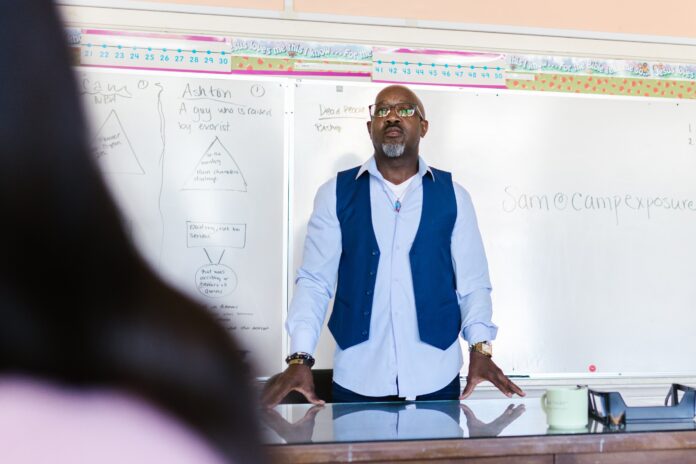
By
Record-breaking heat waves are roasting cities nationwide, and the sky-high temps don’t just make everyone sweaty and dehydrated. It turns out elevated temperatures like the one we’ve seen throughout summer 2023 affect the way students learn, too.
And with racial inequities baked into public education in the United States, the heat disproportionately impacts under-resourced schools attended by low-income Black students. Some student-athletes may be practicing in unsafe temperatures, or kids might be unable to concentrate because their classroom’s a/c either doesn’t work, or hasn’t been installed in the first place.
Sweltering Classrooms
Research shows that when students have more days above 85 degrees Fahrenheit and more days above 90 degrees Fahrenheit in a school year, it affects test scores. Extreme heat negatively impacting low income and minority student achievement has been documented for years, but climate change may be making things worse.
Nine of the 10 hottest years on record have happened in the last decade. Meanwhile, the latest scores from the National Assessment of Educational Progress (NAEP) showed that 13-year-olds’ average reading scores are at their lowest point since 2004, and average mathematics scores have gone down to levels last seen in 1990.
In one study published in 2020, researchers found that “students who experience hotter temperatures during the school year before their exams exhibit reduced learning” and that students scored lower with each additional day of temperatures around 80 degrees or above.
The study also found that heat “has substantially larger impacts on the achievement of students in lower-income school districts,” especially Black and Latino students.
A Lack of A/C
“I feel like you guys don’t care about our school.”
That’s what a fourth-grader at Stege Elementary School in Richmond, California, wrote to the local school board last year about the dilapidated conditions of the 80 year old campus. The school population is predominantly low-income and/or Black.
“To be really honest, I think it’s racism,” the student’s teacher Hannah Geitner told Richmond Confidential. “There’s just a really long history, and like a lot of things you can point to that kind of make it hard to not say it’s racism, especially because there are other Title 1 schools in the district which have been rebuilt and remodeled.”
The Bay Area school is not alone in needing air conditioning. A 2021 report from the Center for Climate Integrity found that more than 13,700 public schools that did not need cooling systems in 1970 now have installed HVAC systems or will need to install one by 2025, at a cost of over $40 billion. The report also found that an additional 13,000 schools or more will need to upgrade their existing HVAC systems, at a cost of more than $414 million.
States Are Approaching Extreme Heat Differently
In Florida, students are back in the classroom after summer vacation, despite cities like Miami, Tampa, Orlando, Daytona Beach, and Tallahassee having their hottest August on record so far.
While some school buildings are equipped to keep educators and students cool throughout the day, some educators said these extended periods of hot weather, particularly in districts that haven’t historically experienced multiple heat waves, make it difficult to teach and are putting students even more at risk.
School reopened for Chicago Public School students on Aug. 21, but the academic year began as extreme heat hit the city.
Chicago saw its highest ever recorded heat index making some parents concerned about whether CPS buildings can handle the heat.
CPS CEO Pedro Martinez and Mayor Brandon Johnson made several stops across the city as students kicked off the school year. Leaders with CPS did not offer any long-term solutions to the infrastructure issue and air conditioning problems within the schools other than to say they hoped the heat wave would pass quickly.
Across the Mississippi River in Iowa, Des Moines Public Schools are also adjusting to the anticipated high heat temperatures, operating on what Phil Roeder, the director of communications for DMPS, called “the rule of 100”.
This means that if the heat index is 100 degrees, schools do not participate in outdoor activities. Recess is to be held indoors when school districts like Ames, Dallas Center-Grimes, Urbandale, and others reach an index of 100, according to a recent report.
What experts agree on is that districts need to address, fix, and adjust safety measures in regard to heat. After all, this is “likely the coolest summer of the rest of your life.



